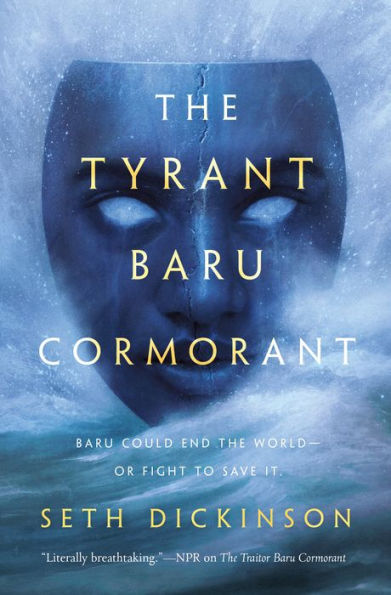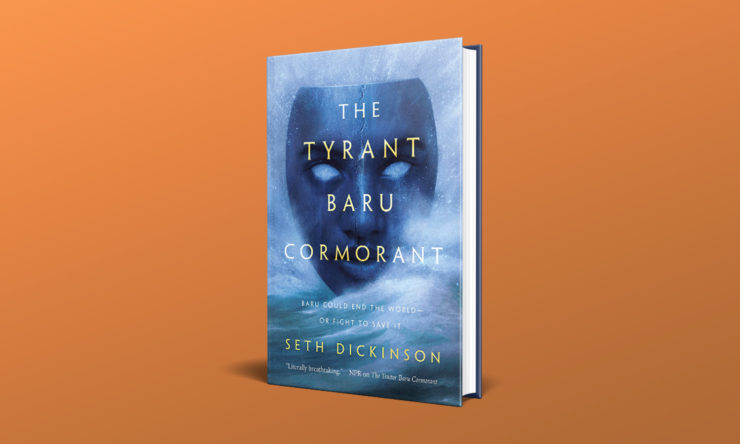Baru Cormorant has witnessed death and she has orchestrated it, has lived with guilt and almost died by its hand. In the third of four novels in Seth Dickinson’s Masquerade series, The Tyrant Baru Cormorant, Baru faces choices and deaths still unprecedented in her quest to destroy the Falcresti empire. With her mind still divided by trauma and grief, she must choose: unleash a weaponized plague to wipe out empire and innocents alike, or trust others to help her forge a new path to rebellion. But how can she ever hope to make a decision this dire when she no longer knows herself? Is she still fighting for her home in Taranoke or has she been manipulated by her imperial benefactor all along?
[Some spoilers for previous books in the series. For a refresher, head here.]
As Baru constantly has to remind herself, though, there are other players in the game: Tau-Indi Bosoka, an Oriati prince and ambassador that strives at first to reunite their friends and then, at their lowest, toward nothing at all; the Canciroth, an ancient Oriati cult divided in its strategies to protect the Oriati Mbo people from Falcrest invasion; and Aminata isiSegu, Baru’s oldest friend, torn between serving a Navy that rewards her loyalty and degrades her race, and protecting Baru in spite of her secrets. Still more players jostle for power and order and change, still more interrupt Baru’s plans with their own. And in the midst of chaos, war brews and cancer grows. There is little time for deliberation, let alone interpersonal drama. But nevertheless, Baru finds a way.
First, the obvious warning: if you are (understandably) avoiding reality during this historical moment of Summer 2020, tread carefully around Tyrant. The plague in question does not, at least, resemble our own epidemic in almost any way. It does, though, dredge up some of its political implications: who will be sacrificed and who will be saved, how it might spur or disrupt social movements, and its endless intersections with histories of colonization. As one character points out, “plague can murder millions, but it cannot mean to do it, and it cannot profit from the death.” There is more talk around plague than there are scenes of illness, but its realities are tied intricately to the intrigue and suspense that make up the series as a whole.
(And oh god, endless body horror in this book, plague-related and otherwise; take note of that.)
Buy the Book


The Tyrant Baru Cormorant
At the end of the day and as always, the characters of The Masquerade drive the story moreso than the unseen forces of fate and disease. These characters may operate as political actors, as individuals, or, more often than not, in the conflict and tension between those identities. Baru herself is the most obvious, being as she’s literally bifurcated into multiple selves, vacillating between her goals of rebellion and her guilt over Tain Hu, her self-as-tool and self-as-deceiver. We see this split in identity mimicked in other storylines as well—Aminata, Iraji, Tau, all grapple with the personal versus the political, and the ways that empire becomes a cancer on your very identity. “The citizen,” one imperial agent tells Baru, “must become a self-ruling subject.” And it is this recursive self-enforcement of political ideology that hovers over all of Tyrant—more than plague, more than war, more than betrayal, and part and parcel of all of these things.
But Dickinson, for all of the ways that he has broken our hearts in this series, hasn’t unmasked himself as a cynic just yet. Choice, again and again, is held up in The Masquerade as power; history, Tyrant seems to say, is made by choice. As Baru muses, “Falcrest was not an innocent victim of historical inevitability”—it was not fate that created empire, but something much more human and complex. And so the characters in the novel grapple with the intersections of race, gender, sexuality, and citizenship—though no single character is a representative of those identities—and their lives as individuals are mirrored by the histories of their nations. What they do and what they choose matters so intimately that readers are kept on the edge of their seats for all 650 pages of this hulking novel.
The structure of the novel just adds to the mounting tension. Told in three alternating points in the timeline, Dickinson shows us what future to expect but not how we got there. Baru is constantly making choices in the “present” timeline that make you think “aha, and that’s what causes xyz to happen”—but not yet, it turns out! There are more twists and turns to come before the future gets made. With characters set on such narrow paths, with such limited definitions of success, you as a reader are constantly aware that a single grain of sand could destroy the machinations of their plans. It’s incredibly thrilling. Since each plotline unfolds over the course of the long novel, though, revelations are made slowly, making the pacing overall feel slow and bulky in spite of the huge incentives to keep reading. Still, I wouldn’t trade this structure for the world, for how affective it is and how well it ties into the themes of choice and historical inevitability.
Overall, Traitor is a compelling, horrifying, and at times bizarre entry in the Masquerade series—as brutal as its predecessors but with, finally, a scattering of hope. It is a culmination of the previous two books, not so much tying up loose ends but making the threads visible in the first place. The pieces of the story I’m left unsure of—usually involving Baru’s convictions about trade and her own righteousness—are successes, rather than failures of the series. If we don’t doubt someone with “tyrant” as their prefix in the title, we may well be doing something wrong as readers.
Book 4, which I am already beside myself waiting for, is sure to play out still more ways that Baru can be wrongheaded (and genius and at times painfully relatable). With any luck, it will also offer up a successful revolution, more fresh insights into politics and history, and an unambiguously happy ending for Tau-Indi. My fingers will remain crossed for the next 1 or more years.
The Traitor Baru Cormorant is available from Tor Books.
Em Nordling is a writer & PhD student in Atlanta, GA.











Hi Tor friends,
“Tau-Indi Bosoka, an Oriati prince and ambassador that strives at first to reunite his friends and then, at their lowest, toward nothing at all”
While it is possible I fucked up terribly and used a he pronoun in the book (I did once in MONSTER), or that I simply failed to convincingly write the character in a way that escaped the male default, Tau is a third gender/laman character, and the pronouns for that gender are rendered in the book as they/them.
Seth
Thank you Torf riends
Hi, Seth! Thanks for the heads up–we’ve fixed that first mistaken pronoun (it looks like the other instance is correct in using they/them). Congratulations on the new book, and thanks for checking in!
Ironic misgendering coming from a genderqueer reviewer! Profound apologies, Seth.
It’s no problem, I’ve made the same mistake myself. I feel like a bit of a prick for putting you on blast in public like this. Our brains are full of associative pathways which alter our behavior at the preconscious level, and the pathways carved in by years of simple social repetition are deep and not easy to change. I want them to make an HD remake of SimAnt